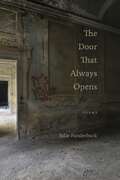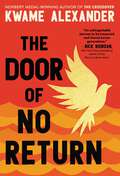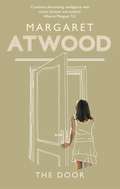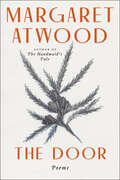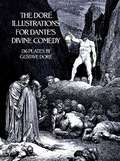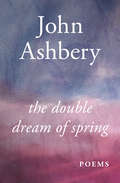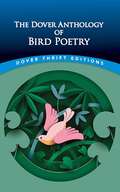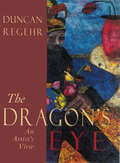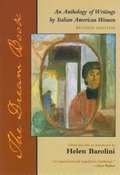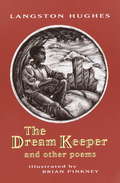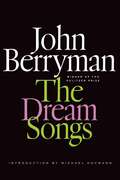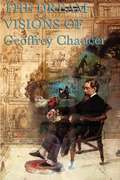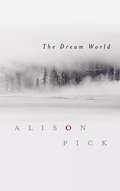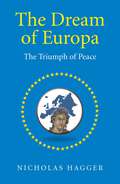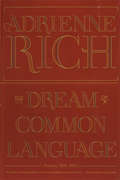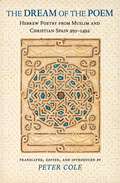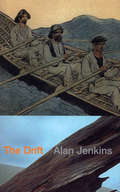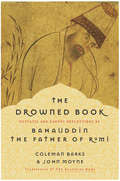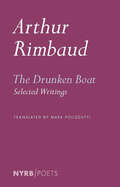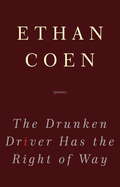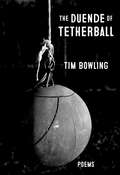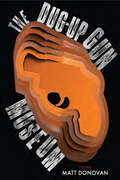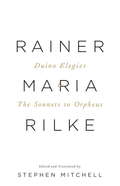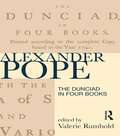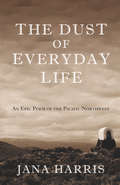- Table View
- List View
The Door That Always Opens: Poems
by Julie FunderburkJulie Funderburk's debut poetry collection, The Door That Always Opens, braids together poems of sharp lyrical imagery and experimental narrative focused frequently on houses: houses under construction or demolition, inhabited, abandoned, and vandalized. Sparkling with details of landscapes and seascapes, her poems depict a state of isometric tension as people struggle to communicate and connect, pulled by feeling and pushed by logic, trapped between choices and mixed loyalties. Despite what is unknown or misunderstood, however, the poems in The Door That Always Opens retain hope, as life persists in the beauty of the visible world.
The Door of No Return (The Door of No Return series #1)
by Kwame AlexanderFrom the Newbery Medal and Coretta Scott King Award winning author Kwame Alexander, comes the first book in a searing, breathtaking trilogy that tells the story of a boy, a village, and the epic odyssey of an African family. In his village in Upper Kwanta, 11-year-old Kofi loves his family, playing oware with his grandfather and swimming in the river Offin. He&’s warned though, to never go to the river at night. His brother tells him &”There are things about the water you do not know. &“ Like what? Kofi asks. &“The beasts.&” His brother answers. One fateful night, the unthinkable happens and in a flash, Kofi&’s world turns upside down. Kofi soon ends up in a fight for his life and what happens next will send him on a harrowing journey across land and sea, and away from everything he loves. This spellbinding novel by the author of The Crossover and Booked will take you on an unforgettable adventure that will open your eyes and break your heart. The Door of No Return is an excellent choice for independent reading, sharing in the classroom, book groups, and homeschooling.An instant #1 New York Times Bestseller!
The Door: Poems
by Margaret AtwoodBy the author of The Handmaid's Tale and DearlyTHE DOOR is Margaret Atwood's first book of poetry since the 1995 MORNING IN THE BURNED HOUSE. Its lucid yet urgent poems range in tone from lyric to ironic to meditative to prophetic, and in subject from the personal to the political viewed in its broadest sense. They investigate the mysterious writing of poetry itself, as well as the passage of time and our shared sense of mortality. As the New York Times has said, 'Atwood's poems are short, glistening with terse, bright images. . . ' A brave and compassionate book, THE DOOR interrogates the certainties that we build our lives on.'One of the best books by one of the best poets writing in English' TLS
The Door: Poems (Canadensis Ser.)
by Margaret Atwood Phoebe LarmoreA book of fifty lucid, urgent poems from internationally acclaimed, award-winning, bestselling author Margaret Atwood.In The Door, Margaret Atwood investigates the mysterious writing of poetry itself as well as the passage of time and our shared sense of mortality. The Door ranges in tone from lyric to ironic to meditative to prophetic, and touches on subjects both personal and political. Brave and compassionate, this collection interrogates the certainties that we build our lives on and reminds us once again of Atwood's unique accomplishments as one of the finest and most celebrated writers of our time.
The Doré Illustrations for Dante's Divine Comedy: 136 Plates (Dover Fine Art, History of Art)
by Gustave DoréGustave Doré (1832–83) was perhaps the most successful illustrator of the nineteenth century. His Doré Bible was a treasured possession in countless homes, and his best-received works continued to appear through the years in edition after edition. His illustrations for Dante's Divine Comedy constitute one of his most highly regarded efforts and were Doré's personal favorites.The present volume reproduces with excellent clarity all 135 plates that Doré produced for The Inferno, Purgatory, and Paradise. From the depths of hell onto the mountain of purgatory and up to the empyrean realms of paradise, Doré's illustrations depict the passion and grandeur of Dante's masterpiece in such famous scenes as the embarkation of the souls for hell, Paolo and Francesca (four plates), the forest of suicides, Thaïs the harlot, Bertram de Born holding his severed head aloft, Ugolino (four plates), the emergence of Dante and Virgil from hell, the ascent up the mountain, the flight of the eagle, Arachne, the lustful sinners being purged in the seventh circle, the appearance of Beatrice, the planet Mercury, and the first splendors of paradise, Christ on the cross, the stairway of Saturn, the final vision of the Queen of Heaven, and many more.Each plate is accompanied by appropriate lines from the Henry Wadsworth Longfellow translation of Dante's work.
The Double Dream of Spring: Poems (The\american Poetry Ser. #Vol. 8)
by John AshberyOne of Ashbery&’s most important masterworks: Widely studied, critically admired, and essential to understanding one of the modern era&’s most revolutionary poetsThe Double Dream of Spring, originally published in 1970, followed the critical success of John Ashbery&’s National Book Award–nominated collection Rivers and Mountains and introduced the signature voice—reflective, acute, and attuned to modern language as it is spoken—that just a few years later would carry Ashbery&’s Pulitzer Prize–winning masterpiece Self-Portrait in a Convex Mirror. Ashbery fans and lovers of modern poetry alike will recognize here some of the century&’s most anthologized and critically admired works of poetry, including &“Soonest Mended,&” &“Decoy,&” &“Sunrise in Suburbia,&” &“Evening in the Country,&” the achingly beautiful long poem &“Fragment,&” and Ashbery&’s so-called Popeye poem, the mordant and witty &“Farm Implements and Rutabagas in a Landscape.&” The Double Dream of Spring helped cement Ashbery&’s reputation as a must-read American poet, and no library of modern poetry is complete without it.
The Dover Anthology of Bird Poetry (Dover Thrift Editions: Poetry)
by Heidi GagnonPoets have long treated birds as a captivating source of inspiration as metaphors, references, and symbols of death, eternity, life, love, power, religious beliefs, and superstitions. Others have used different types of birds to express their thoughts and emotions. This volume highlights these remarkable creatures as they take flight from the Elizabethan era through the twentieth century. Selections from classic to contemporary authors include poems by William Blake, Emily Dickinson, John Keats, Herman Melville, Edgar Allan Poe, Wallace Stevens, William Carlos Williams, William Butler Yeats, and others. This anthology is ideal for classroom use, independent study, and personal perusal.
The Dragon's Eye
by Duncan RegehrNever one to be bewitched by the appearance of things, Duncan Regehr has devoted his life to going below the surface, reaching into the depths of psychology and the unconscious. His paintings and poetry explore his well-thought-out and penetrating assessment of humanity and the evolution of his social consciousness. Here he looks back at his relationship to nature, society, and the human condition. In series such as "Geoscapes," "Smokin Gun," and "The Grand Theme," he depicts environmental and societal changes - where we have come from and where we are headed. In the spectacular paintings presented here, Regehr's clarity of thought about our complex world is characteristically rendered with jewel-like use of color and many-faceted imagery
The Dream Book: An Anthology Of Writing By Italian American Women
by Helen BaroliniA collection of 56 works by Italian American women writers, drawing on rare sources and archival material. Works encompass genres of prose, poetry, oral history, and fiction. An introductory essay examines barriers to Italian American women writers, within their own ethnic tradition and within the world of publishing. Originally published in 1985 by Schocken Books. Barolini is author of seven books and many short stories.
The Dream Keeper and Other Poems
by Langston HughesIllus. in black-and-white. This classic collection of poetry is available in a handsome new gift edition that includes seven additional poems written after The Dream Keeper was first published. In a larger format, featuring Brian Pinkney's scratchboard art on every spread, Hughes's inspirational message to young people is as relevant today as it was in 1932.From the Trade Paperback edition.
The Dream Songs (FSG Classics Series)
by Michael Hofmann John Berryman Daniel SwiftJohn Berryman's The Dream Songs are perhaps the funniest, saddest, most intricately wrought cycle of poems by an American in the twentieth century. They are also, more simply, the vibrantly sketched adventures of a uniquely American antihero named Henry. Henry falls in and out of love, and is in and out of the hospital; he sings of joy and desire, and of beings at odds with the world. He is lustful; he is depressed. <p><p> And while Henry is breaking down and cracking up and patching himself together again, Berryman is doing the same thing to the English language, crafting electric verses that defy grammar but resound with an intuitive truth: "if he had a hundred years," Henry despairs in "Dream Song 29," "& more, & weeping, sleepless, in all them time / Henry could not make good." <p><p> This volume collects both 77 Dream Songs, which won Berryman the Pulitzer Prize in 1965, and their continuation, His Toy, His Dream, His Rest, which was awarded the National Book Award and the Bollingen Prize in 1969. The Dream Songs are witty and wild, an account of madness shot through with searing insight, winking word play, and moments of pure, soaring elation. This is a brilliantly sustained and profoundly moving performance that has not yet-and may never be-equaled.
The Dream Visions of Geoffrey Chaucer
by Geoffrey ChaucerCompiled here are some of Chaucer's shorter poems. These poems are all written using the Dream Vision. To name a few of these peoms: The Book of Duchesse, The Parliament of Fowls, The Legend of Good Women, The House of Fame, and other short poems.
The Dream World
by Alison PickIn her elegant new collection, Alison Pick, a brilliant poet of sensuous moods, atmospheres, and dreams, explores the mystery concealed within the world we know and recognize. Always evocative, always alluring, her poems are not interested in mere events, but in the fabric inside the emotions that events can provoke. She writes of love, of leaving, of wandering, and of home -- not necessarily in that order. With captivating language and shining imagery, her poems travel out through layers of landscape -- residential, geographic, emotional, cerebral -- creating a guidebook to the hidden, a sparkling tour through the lush and varied backcountry of human experience.From the Trade Paperback edition.
The Dream of Europa: The Triumph of Peace
by Nicholas HaggerIn The Dream of Europa, following the tradition of celebratory court masques in verse by Ben Jonson and more recently William Empson, Nicholas Hagger celebrates the court of the leaders of the European Union. Through a chorus of 50 representatives of European states he presents the growth and expansion of what became the EU in an epic sweep that takes us from 1945 to 2015 and incorporates the five elements (prologue, antimasque, masque, revels, epilogue) and blend of mythology and history found in all masques. Zeus asks Europa, the goddess of Europe, to sort out the chaos and disorder that devastated Europe in 1945. Europa presides over the growing unification of a European Union of 28 states with 22 more expected to join. Celebratory revels acclaim the Treaty of Lisbon but there is a discordant note, and Churchill has strong words for the UK representative. Finally Europa hands the EU back to Zeus. The dream of Europa is that one day the EU will turn into a United States of Europe consisting of 50 states (see front cover) like the USA, and will bring in a Universalist World State. As a court entertainment for European leaders celebrating Europe&’s progress from disorder to order, The Dream of Europa cries out to be performed in Brussels. It heralds the triumph of peace during the 70 years following 1945 and calls for a strengthening of European unity in the face of an expanding Russia that still regards Eastern Europe as being within its sphere of influence. This masque and its informative appendix on European states and rights will appeal to all generations in the 50 European states and to all beyond who value a peaceful Europe in our troubled time.
The Dream of a Common Language: Poems 1974-1977
by Adrienne Rich"Certain lines had become like incantations to me, words I'd chanted to myself through sorrow and confusion" --Cheryl Strayed, Wild "The Dream of a Common Language explores the contours of a woman's heart and mind in language for everybody--language whose plainness, laughter, questions and nobility everyone can respond to. . . . No one is writing better or more needed verse than this."--Boston Evening Globe
The Dream of the Poem: Hebrew Poetry from Muslim and Christian Spain, 950-1492 (The Lockert Library of Poetry in Translation #58)
by Peter ColeHebrew culture experienced a renewal in medieval Spain that produced what is arguably the most powerful body of Jewish poetry written since the Bible. Fusing elements of East and West, Arabic and Hebrew, and the particular and the universal, this verse embodies an extraordinary sensuality and intense faith that transcend the limits of language, place, and time. Peter Cole's translations reveal this remarkable poetic world to English readers in all of its richness, humor, grace, gravity, and wisdom. The Dream of the Poem traces the arc of the entire period, presenting some four hundred poems by fifty-four poets, and including a panoramic historical introduction, short biographies of each poet, and extensive notes. (The original Hebrew texts are available on the Princeton University Press Web site.) By far the most potent and comprehensive gathering of medieval Hebrew poems ever assembled in English, Cole's anthology builds on what poet and translator Richard Howard has described as "the finest labor of poetic translation that I have seen in many years" and "an entire revelation: a body of lyric and didactic verse so intense, so intelligent, and so vivid that it appears to identify a whole dimension of historical consciousness previously unavailable to us." The Dream of the Poem is, Howard says, "a crowning achievement."
The Drift
by Alan JenkinsALAN JENKINS - POERTY IS EXHILARATING. . . . . IT IS CHARGED WITH EROTIC ENERGY, RAGE, SORROW AND CONFUSION. - DAVID LEHMAN The poeoms in Alan Jenkin's magnificent new collection are closely linked, forming a movingly autobiographical book which deals with the disjunction between the aspirations of youth and the realities of middle-age. The narrator looks back on his twenties, full of the grand ambition to be the next Rimbaud, and wryly contrasts it with his current situation: friends dead, women lost, opportunities missed. Images of drifting, of the random patterns that fate imposes on existence, weave their way through poems full of sea-scapes and sailing boats. Ghosts loom through the mist; objects imbued with memory accumulate like driftwood. But although Alan Jenkins writes about a sense of loss and failure -his rich poetry formally dextrous and inventive, witty and subtle in its allusions - acts as a counterbalance, showing how the twisting of an emotion into shape can salvage feelings of pointlessness. Through his personal experience, he explores themes that will resonate with a broad audience: the difference between men and women.
The Drowned Book
by Coleman Barks John MoyneThe Lost Words of the Sufi Master and Father of RumiBahauddin, Rumi's father, was not only a major force in the development of Islamic spirituality, but also a deeply influential force in his son's life. In this, the first ever substantial English version of a wonderful but virtually unknown book, Bahauddin proves to be a daring, spiritual genius. His voice comes through the delightful, passionate craft of Coleman Barks, who transforms the Persian translations of John Moyne into fresh spiritual literature.
The Drunken Boat: Selected Writings
by Arthur RimbaudA new translation of the best and most provocative work by France's infamous rebel poet. Poet, prodigy, precursor, punk: the short, precocious, uncompromisingly rebellious career of the poet Arthur Rimbaud is one of the legends of modern literature. By the time he was twenty, Rimbaud had written a series of poems that are not only masterpieces in themselves but that forever transformed the idea of what poetry is. Without him, surrealism is inconceivable, and his influence is palpable in artists as diverse as Henry Miller, John Ashbery, Bob Dylan, and Patti Smith. In this essential volume, renowned translator Mark Polizzotti offers authoritative and inspired new versions of Rimbaud&’s major poems and letters, including generous selection of Illuminations and the entirety of his lacerating confession A Season in Hell—capturing as never before not only the meaning but also the daredevil attitudes and incantatory rhythms that make Rimbaud&’s works among the most perpetually modern of his or any other generation.
The Drunken Driver Has the Right of Way: Poems
by Ethan CoenIn his screenplays and short stories, Coen surprises and delights with a rich brew of ideas, observations, and perceptions. His first collection of poems is remarkable-funny, ribald, provocative, sometimes raw, and often touching and profound.
The Duende of Tetherball
by Tim BowlingThe Duende of Tetherball fearlessly ransacks the scrutinizing role of the past on the present; the interactions and accountabilities of ourselves and other species; the challenges and pleasures of getting older and forever striving to balance our most cherished and often incomprehensible relationships both with the world and each other.Bowling strives to account for and address our human need to resolve the tension between personal freedom and a world burdened by increasing homogenization and centralized control by adopting an industry of personal fortitude and thoughtful redress. He seeks to remember and to remember again the lessons polished over a lifetime: "Fifteen, scared but still apt / to toss "damn thee black / thou cream-faced loon" / in PE class at the rippling back / of some hoop or net-bound jock, / I was learning - too soon - / the only lesson that counts: / how to be alone."
The Dug-Up Gun Museum (American Poets Continuum Series #197)
by Matt DonovanTraveling the nation, Matt Donovan examines the paradox of a country plagued by gun violence yet consumed with protecting the right to bear arms.Matt Donovan’s The Dug-Up Gun Museum confronts our country’s obsession with guns to explore America’s deep-seated political divisions and issues linked to violence, race, power, and privilege. Taking its title from an actual museum located in Wyoming, this collection of poems interrogates our country’s history of gun violence, asking questions about our fetishization of weapons, how mass shootings and the killing of unarmed civilians by police have become normalized, and the multitudinous ways in which firearms are ingrained in our country’s culture. Much like the poet himself, Donovan’s poems are dynamic and constantly in motion as he explores the ways in which capitalism and its relentless stream of content have led to a collective desensitization in the face of violence. In turns harrowing, elegiac, and ironic, set in locations ranging from Cody to Chicago, from Las Vegas to Sandy Hook, The Dug-Up Gun Museum probes America’s failures, bizarre infatuations, and innumerable tragedies linked to guns.
The Duino Elegies & The Sonnets to Orpheus
by Rainer Maria Rilke Stephen MitchellAvailable for the first time in a single volume, Ranier Maria Rilke's two most beloved sequences of poems rendered by his most faithful translator. Rilke is unquestionably the twentieth century's most significant and compelling poet of romantic transformation and spiritual quest. His poems of ecstatic identification with the world exert perennial fascination. In Stephen Mitchell's versions of Rilke's two greatest masterpieces readers will discover an English rendering that captures the lyric intensity, fluency, and reach of his poetry. Stephen Mitchell adheres impeccably to Rilke's text, to his formal music, and to the complexity of his thought; at the same time, Mitchell's work has authority and power as poetry in its own right.
The Dunciad in Four Books: The Dunciad (1728) And The Dunciad Variorum (1729) (Longman Annotated Texts)
by Valerie RumboldThe Dunciad in Four Books of 1743 was the culmination of the series of Dunciads which Alexander Pope produced over the last decade and a half of his life. It comprises not only a poem, but also a mass of authorial annotation and appendices, and this authoritative edition is the only one available which gives all the verse and the prose in a clearly laid-out form, with a full modern commentary. Accessibly presented on the same page as Pope’s text are explanatory notes, written in a style adapted to the needs of undergraduate readers, but still comprehensive enough to address the interests of scholars. The many books and pamphlets to which Pope refers have been examined in detail, and the commentary takes advantage of the fifty years’ scholarship on literary, bibliographical, cultural and political aspects of the period which has accumulated since James Sutherland’s The Dunciad, volume five of the Twickenham Edition. A substantial introduction offers a stimulating and helpful approach to the work, and the bibliography includes extensive suggestions for further reading.
The Dust of Everyday Life
by Jana HarrisSpanning the years 1853-1933--beginning with conveyance by oxcart and ending with air travel--this series of dramatic monologues tells the story of Helen Walsh and Thomas Hodgson, whose families trekked the trails of the great migration to the West. Helen and Thomas get married, and together, tame the remote corners of the wilderness by means of their imperishable love and a clear, well-beaten path.
